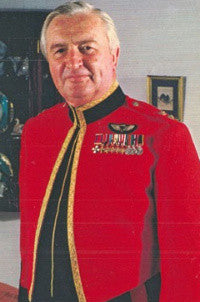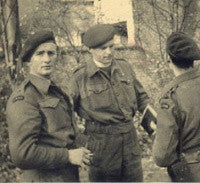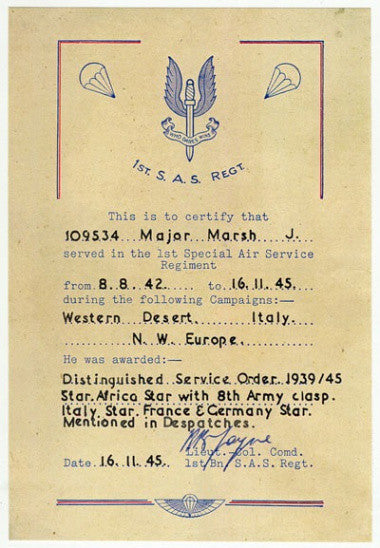War medals and documents belonging to the former commander of the Bermuda Regiment have sold for more than £60,000 at Warwick & Warwick's December auction.
The late Lieutenant Colonel John Anthony Marsh was a highly-decorated Second World War veteran, who later served with the elite SAS.
 Lieutenant Colonel Marsh, later in life |
His DSO, OBE and twice MID group of medals alone sold for £37,950 to an unknown collector in Britain - considerably over their £10,000 pre-sale estimate.
Upon leaving school, Marsh served as a private in the Artist's Rifles, and was commissioned into the DCLI at the start of WW2. He later transferred to the SAS, where he served with 1st SAS through its North African campaign.
From September 1942 until February, 1943, Marsh fought in a squadron under the famous Major Paddy Mayne, behind German lines in the Western Desert.
He later took part in the Kufra raids in Libya. Around this time, he is thought to have been the first Allied officer into Tripoli after the German surrender in North Africa.
Following the North African campaign and the disbandment of the SAS, Captain Marsh became the commander of A Section Number Two Troop in the newly-formed elite Special Raiding Squadron (SRS), called-upon for special assaults in support of the Army.
Captain Marsh and the SRS's first job was to capture a large coastal battery at Capo Murro di Porco: six heavy guns entrenched on some cliffs near Syracuse with a garrison of about 700. The battery had to be silenced before the main invasion force could land.
Landing under cover of darkness in heavy seas on July 10, 1943, the SRS scaled the cliffs and succeeded in destroying the battery. They killed some 100 Italian defenders and captured over 200, while suffering only one SRS casualty: a remarkable achievement.
On July 12, they marched into Syracuse and boarded their assault ship, the Ulster Monarch, where they were almost immediately tasked with an attack on the Italian Naval Base of Augusta. They duly captured it in the face of German and Italian opposition.
The Allied invasion of the Italian mainland commenced on September 3, 1943. The SRS were soon called upon to land behind the German defensive lines at the town of Bagnara, with Marsh again being involved.
 Marsh at war (pictured far left) |
Despite heavy opposition from the German garrison, the Germans withdrew when the main Allied forces arrived, leaving the town in Allied hands.
Three weeks later, the SRS landed and helped to disrupt German resistance at the port of Termoli on the Italian Adriatic coast, aiding the advance of the Allied 78th Division up the coastline.
The award of the DSO to Captain Marsh was announced in the London Gazette dated 27th January, 1944, for his action with the SRS at Termoli in October 1943.
"Captain Marsh, with 56 men, was holding a front of one mile on the right flank of the Sector west of TERMOLI," read the citation.
"Despite the intensity of enemy fire he held fast and with his own fire pinned down groups of enemy infantry which attempted to infiltrate into his own position."
Striking north to join up with his right hand Section he came across two wounded men. Despite being completely cut off, he took the wounded men with him, until the enemy were finally pinned down by machine gun fire.
 Major Marsh's Distinguished Service Order (DSO) from 1945 |
He eventually succeeded in evacuating all the wounded men to Allied lines under cover of darkness, although only 150 yards from an enemy post.
Captain Marsh showed great coolness and determination throughout. His high standard of courage, and complete disregard for his own personal safety throughout the Operation, played a decisive part in saving a very dangerous situation.
"For a young lieutenant to receive a DSO usually means that he was recommended for a VC, but that this was not subsequently awarded for some technical reason," said a letter written in 1985 from the DCLI Regimental Secretary to Marsh's wife.
"Certainly I found the citation most inspiring to read and believe that it was written with the higher decoration in mind."
The SAS have only been awarded a single Victoria Cross since its formation. This was to Major Anders Lassen for his actions in Italy in April 1945 when he was killed in action.
Major Marsh is mentioned in many of SAS books, including 24 pages about the Termoli attack in These Men Are Dangerous, written by DI Harrison, an SAS officer who was in Captain Marsh's troop.
After his involvement in the Italian campaign, Marsh returned to England in preparation for D-Day. After the invasion he was parachuted behind the enemy lines to assist in disrupting German operations.
He continued through the war in Belgium, Holland, Germany and finally Norway and was twice mentioned in dispatches published in the London Gazette dated May 10 and November 8, 1945.
- More news on Medals and Militaria
- Enjoy the read? Don't forget to sign up for your free newsletter with exclusive content






